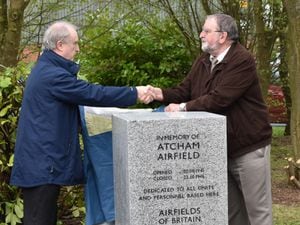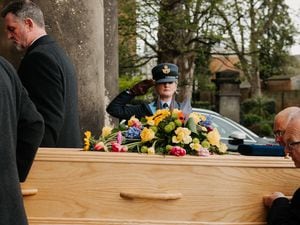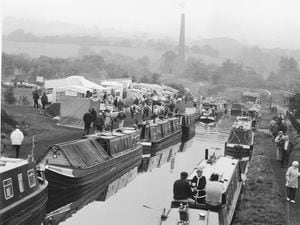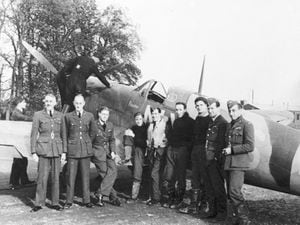How Dutch soldiers made the Midlands their home
With their homeland crushed under the Nazi jackboot, patriots from The Netherlands regrouped on a country estate west of Wolverhampton and prepared to continue the fight against Hitler.
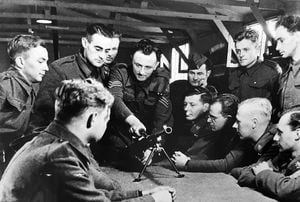
That Dutch military camp during the dark days of the Second World War was to forge an enduring link between the nation and Wolverhampton – as well as giving rise to scores of marriages between local girls and Dutch soldiers.
And now the story of the Wrottesley Park camp, which was home of the Princess Irene Brigade from 1941 to 1944, has been told in a new book by local historian Angus Dunphy.
"I went to Tettenhall College, near Wrottesley, and used to cycle to school at Tettenhall every day," said 74-year-old Angus who, although he lives these days in South Wales, cherishes his Wolverhampton area roots, hailing from Orton Hill, between Lower Penn and Wombourne.
"I knew there had been a camp there, just as I knew there had been RAF Perton next door."
Then, about eight years ago, he was able to buy a complete set of the camp newspapers, called De Bromtol – "The Spinning Top" – on eBay from a dealer in Amsterdam.
They detailed life on the camp, with news from home and abroad, and were also laced with humour and cartoons.
"Of course they're all in Dutch, which presented me a problem as I don't speak Dutch," he said.
But thanks to helpful translators Yvonne Corfield of Shifnal, Lambert Groen of Codsall, and Marijke Brevet, he has been able to extract a fascinating tale for posterity.
As The Netherlands fell, some Dutch forces escaped to Britain, and with numbers swelled by volunteers from the Dutch empire around the world, were organised into a mobile infantry battalion.
Adopt a soldier
In January 1941 Queen Wilhelmina conferred it the title the Royal Netherlands Princess Irene Brigade, named after her infant granddaughter.
The unit was at various camps before settling at the Wrottesley Park estate, with the first troops arriving in May 1941 and a huge hutted camp began to take shape, complete with its own hospital and recreation facilities.
"At any one point there were 1,500 there, but over the three-year period there were probably 4,500 who went through," said Angus.
"They liked Wrottesley and they liked Wolverhampton. In the early days the Express & Star ran a big 'adopt a soldier' campaign and they would visit families and stay with them.
"Wolverhampton also had the picture houses, the dance halls, and the pubs, which they would enjoy. There were a couple of buses, but a lot of them cycled in to Wolverhampton."
Coming back after a night out, the Rock at Tettenhall was a tough uphill physical barrier, which they regarded as "Mount Blanc" and one of the cartoons imagines them being helped up with a winch in the Tettenhall clock tower.
Naturally the Dutch soldiers got to know the local girls with resulting romances and, although Angus says he can only guess at the figure, he thinks there may have been over 100 marriages resulting, with some couples staying locally, but many going to the Netherlands after the war.
Members of the Dutch family visited the camp – the Queen on several occasions, and also Prince Bernhard – while General Montgomery addressed the troops in March 1944, shortly before D-Day.
All the while the soldiers were training for battle, and the brigade landed in Normandy on August 4, 1944, to join the liberation of Europe and, as the last issue of De Bromtol put in on September 15, "a joyful ending because we are back on the continent heading for home."
Afterwards Wrottesley Park became a transit camp for liberated Dutchmen, and also a demobilisation centre, but by 1947 it was all over.
Angus said: "Physically, there's nothing left of the old camp, although in 1954 the villagers of Lower Penn, with support from the county council, bought a couple of officers' huts and transported them to Lower Penn for use as a village hall – Lower Penn Victory Hall."
The Dutch presence however forged a bond with post-war exchange visits with the Dutch town of Tilburg, and continues to be remembered with an annual ceremony in Wolverhampton every November which honours 23 Dutch soldiers and airmen who lie at the Jeffcock Road cemetery at Merridale.
"The Princess Irene Brigade at Wrottesley Park, 1941-44" can be bought direct from Mr Dunphy by sending a cheque for £16, which includes postage, to him at 8 Chestnut Close, Dinas Powys, Vale of Glamorgan, CF64 4TJ, enclosing a return address of course.
He says it is also on sale at Ashwood Nurseries, near Kingswinford, and at Waterstones in Wolverhampton.


